Hello! So I Want To Get More Into Literature, Like The Eras And Classics I Should Read. (I Like To Write
Hello! So I want to get more into literature, like the eras and classics I should read. (I like to write so I want to educate myself) Where should I start? Or maybe could u give me a list of good ones? (If this is in ur FAQ I'm so so so sorry I don't know how to access it on my phone and I don't have a computer I can get to!) thanks so much if u respond!!! :) love ur blog!
Well, first of all, thank you! And secondly: oh my, an essentials guide to all literature? Since I’m rather narrow in my interests and I haven’t studied literature in any capacity other than in high school (I’m graduating this summer), I can’t guarantee this will be as objective or thorough as it should be, but I’ll give it my best shot.
This is going to be mostly European literature and listed chronologically era-wise (era as in historical, not literary) but probably not author-wise, the former because the education system where I live is focused on European literature and history, and the latter because I list these as they come to me.
Another thing to note is some of these are works you should know about and not absolute must-reads, as they can be very long and hard to read, but are crucial to know because they’ve been historically influential and/or have inspired countless other works.
A third note: certain… 20th century parts of this list don’t reflect my personal preferences at all. Take from that what you will.
Right then, this introduction has taken long enough… here we go.
WESTERN LITERATURE: A MASTERLIST (of sorts)
CLASSICAL
Subdivision: Greek
my existing rec list here
Aeschylus. Oresteia.
Aristophanes. Lysistrata.
Plato. The Republic.
Subdivision: Latin
Cicero. Catiline Orations.
Julius Caesar. Commentaries on the Gallic War.
Virgil. The Aeneid.
Ovid. Metamorphoses.
Seneca the Younger. Epistles.
Apuleius. Metamorphoses (which is sometimes known as The Golden Ass).
MEDIEVAL
Dante Alighieri. The Divine Comedy.
Petrarca. Song Book.
Boccaccio. Decameron.
Geoffrey Chaucer. The Canterbury Tales.
Elder Edda.
Sir Thomas Malory. Le Morte d’Arthur.
Subdivision: epic poems
Beowulf.
Poem of the Cid.
The Song of the Nibelungs.
The Song of Roland.
The Tale of Igor’s Campaign.
EARLY MODERN
Subdivision: Shakespeare.
Romeo & Juliet.
Hamlet.
A Midsummer Night’s Dream.
Othello.
Julius Caesar.
King Lear.
Much Ado About Nothing.
Molière. Tartuffe. || Don Juan. || The Misanthropist.
Cervantes. Don Quixote.
Christopher Marlowe. Doctor Faustus.
John Donne. The Canonization.
John Milton. Paradise Lost.
EDIT: didyouknowflaubert suggested in addition:
François Rabelais. The Life of Gargantua and of Pantagruel.
Michel de Montaigne. various essays.
18th CENTURY
Daniel Defoe. Robinson Crusoe. || Moll Flanders.
Eliza Haywood. Love in Excess.
Voltaire. Candide. || Micromégas.
Rousseau. Émile.
Frances Burney. Evelina.
René Descartes. Meditations on First Philosophy.
19th CENTURY
Subdivision: Romanticism
my existing rec list here.
Charles Dickens. Bleak House. || A Tale of Two Cities. || Great Expectations. || Oliver Twist.
William Makepeace Thackeray. Vanity Fair.
Charlotte Brontë. Jane Eyre.
Emily Brontë. Wuthering Heights.
Anne Brontë. The Tenant of Wildfell Hall.
Thomas Hardy. Tess of the d’Urbervilles. || Far from the Madding Crowd.
Emily Dickinson. various poetry.
Nathaniel Hawthorne. The Scarlet Letter.
Mark Twain. The Adventures of Tom Sawyer. || The Prince and the Pauper.
Walt Whitman. Leaves of Grass.
Oscar Wilde. The Picture of Dorian Gray.
Robert Louis Stevenson. Strange Case of Dr Jekyll and Mr Hyde.
Fyodor Dostoyevsky. Crime and Punishment. || The Idiot.
Johann Wolfgang von Goethe. Faust. || The Sorrows of Young Werther.
Victor Hugo. Les Misérables. || The Hunchback of Notre-Dame.
Jane Austen. Pride and Prejudice. || Emma. || Northanger Abbey.
Anton Chekhov. Three Sisters. || The Cherry Orchard. || various short stories.
Thomas Babington Macaulay. Critical and Historical Essays.
Leo Tolstoy. War and Peace. || Anna Karenina.
H. G. Wells. The Time Machine. || The War of the Worlds.
Gustave Flaubert. Madame Bovary.
Guy de Maupassant. Bel-Ami. || Mont-Oriol. || various short stories.
Aldous Huxley. Brave New World.
Bram Stoker. Dracula.
20th CENTURY
E. M. Forster. A Room with a View.
W. B. Yeats. various poetry.
Maurice Maeterlinck. The Blue Bird.
Franz Kafka. The Metamorphosis.
Virginia Woolf. Between the Acts. || Mrs Dalloway.
T. S. Eliot. The Love Song of J. Alfred Prufrock.
James Joyce. Ulysses.
Hermann Hesse. Steppenwolf.
F. Scott Fitzgerald. The Great Gatsby.
Ernest Hemingway. For Whom The Bell Tolls. || The Sun Also Rises.
H. P. Lovecraft. The Call of Cthulhu.
Erich Maria Remarque. All Quiet on the Western Front. || Arc de Triomphe.
Evelyn Waugh. Brideshead Revisited.
Vladimir Nabokov. Lolita.
John Steinbeck. Of Mice and Men. || East of Eden.
J. R. R. Tolkien. The Hobbit. || The Lord of the Rings.
Daphne du Maurier. Rebecca.
George Orwell. 1984. || Animal Farm.
Margaret Mitchell. Gone with the Wind.
Anne Frank. The Diary of a Young Girl.
Harper Lee. To Kill a Mockingbird.
William Golding. Lord of the Flies.
Ray Bradbury. Fahrenheit 451.
Allen Ginsberg. Howl and Other Poems.
Jack Kerouac. On the Road.
J. D. Salinger. The Catcher in the Rye.
Kurt Vonnegut. Slaughterhouse-Five.
Sylvia Plath. The Bell Jar.
Gabriel García Márquez. One Hundred Years of Solitude. || Love in the Time of Cholera.
Mikhail Bulgakov. The Master and Margarita.
Thomas Harris. The Red Dragon.
Michael Ondaatje. The English Patient.
Neil Gaiman. Stardust.
Bret Easton Ellis. American Psycho.
Donna Tartt. The Secret History.
Chuck Palahniuk. Fight Club.
Stephen King. Carrie. || The Shining. || The Dark Tower.
Shirley Jackson. We Have Always Lived in the Castle. || The Lottery.
Tom Stoppard. Rosencrantz and Guildenstern Are Dead.
Simone de Beauvoir. The Second Sex.
Jorge Luis Borges. Book of Imaginary Beings. || various short stories.
Terry Pratchett & Neil Gaiman. Good Omens.
21st CENTURY
Haruki Murakami. Kafka on the Shore. || 1Q84.
Suzanne Collins. The Hunger Games.
Neil Gaiman. American Gods.
Ian McEwan. Atonement.
Jeffrey Eugenides. Middlesex.
Kazuo Ishiguro. Never Let Me Go.
J. K. Rowling. Harry Potter.
Khaled Hosseini. The Kite Runner. || A Thousand Splendid Suns.
Carlos Ruiz Zafón. The Shadow of the Wind.
Gillian Flynn. Sharp Objects. || Gone Girl.
Elizabeth Kostova. The Historian.
Cormac McCarthy. No Country for Old Men.
Richard Siken. Crush.
Mark Z. Danielewski. House of Leaves.
Donna Tartt. The Little Friend. || The Goldfinch.
Elizabeth Wein. Code Name Verity.
Warsan Shire. Teaching My Mother How to Give Birth.
Catherynne M. Valente. Deathless.
Sofi Oksanen. The Purge.
This is more or less all I’ve got… for now.
Good luck!
xx
More Posts from Vcsupertramp and Others
I lost my best friend 3 years ago- not lost as in dead but lost as in we only text each other on our birthdays now. Movies and books don't tell you that a friendship dying is like the sinking of a ship, you try to get higher and higher and hold onto the rails and unanswered texts, the captain tries to steer it to safety and salvage pieces of two broken hearts until you're left with memories of what once was. We were friends for a decade and knew each other's diaries by heart, I still remember her phone number and the way she took her coffee. Seeing her in streets is like breathing in a scent you forgot you knew but it immediately takes you back to a summer in '07.
Movies and books also don't tell you that friendships don't just end after one fight or incident, it's like the rusting of a bridge, the slow decay of flesh and bones and secrets. It took weeks, months- until one day I woke up and I realized I hadn't thought of her in a while. And I wrote a poem that day and I titled it 'The dying of a best friend' and I put all my love for her in a tiny box with my half of the matching pendant of a dolphin we had and stored them in a corner of my heart under the heading Grief. Where else can one hide unspent love?
It's been 3 years since I lost my best friend, lost as in I still carry our secrets in a tiny box but we only text each other on our birthdays.
-Ritika Jyala, excerpt from The world is a sphere of ice and our hands are made of fire
Edit: here's the visualizer for this piece
We do not remember days, we remember moments.
— Jennifer Niven, All the Bright Places
What's your best example of correlation not equaling causation?

Cinematography - Shot Size
Shot size is an important part of cinematography. It can show off a location, make a character seem small or powerful, highlight emotion or distance the audience. These shot sizes have basic definitions, but the specifics can vary from filmmaker to filmmaker. Below is a list of shot sizes, their general descriptions, abbreviations, alternate names, and effects.
Keep reading
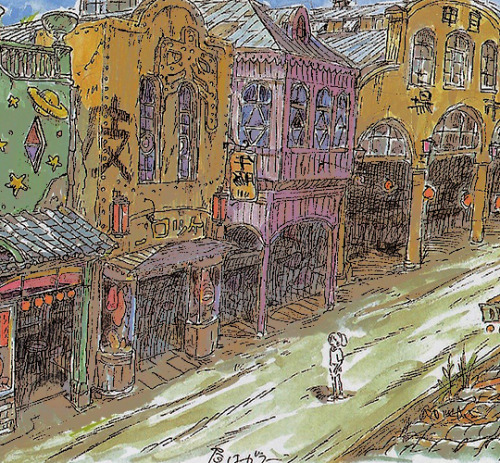
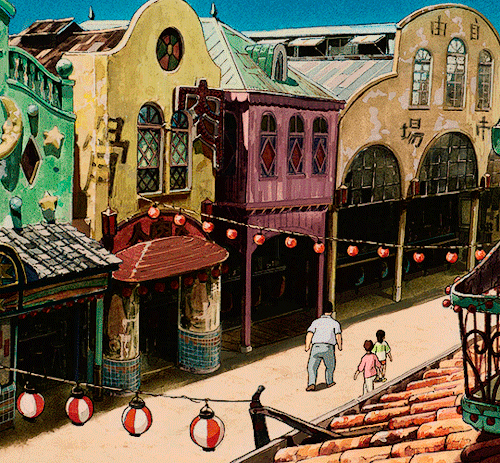
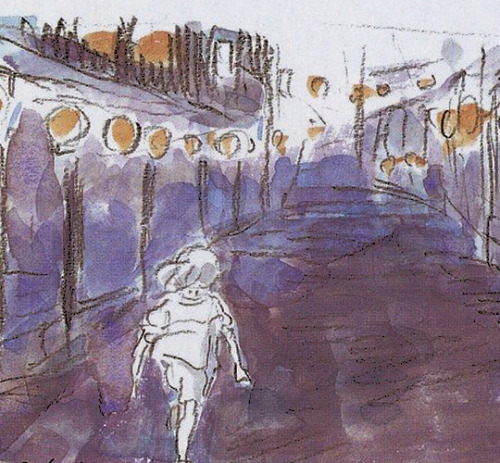
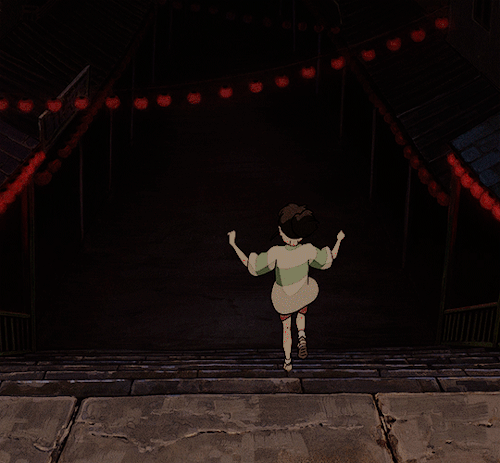
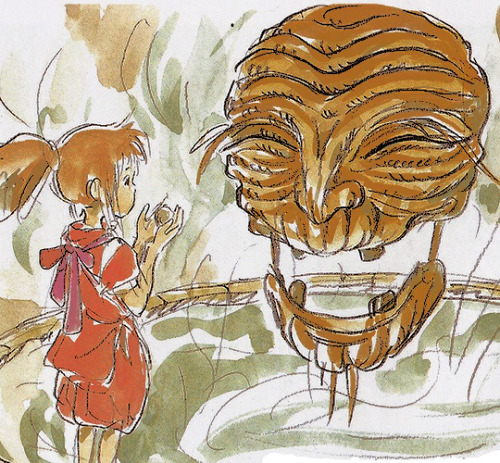
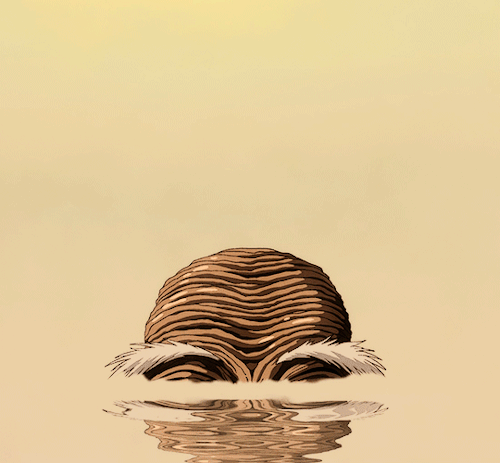
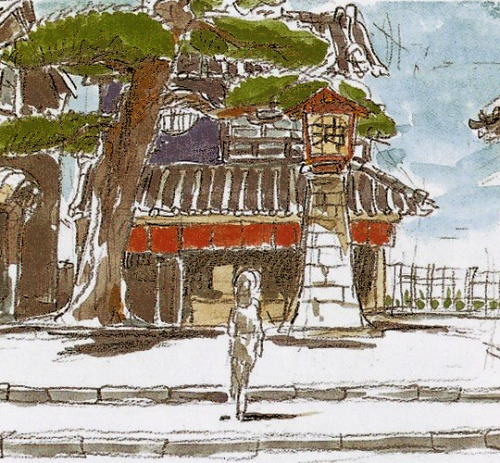
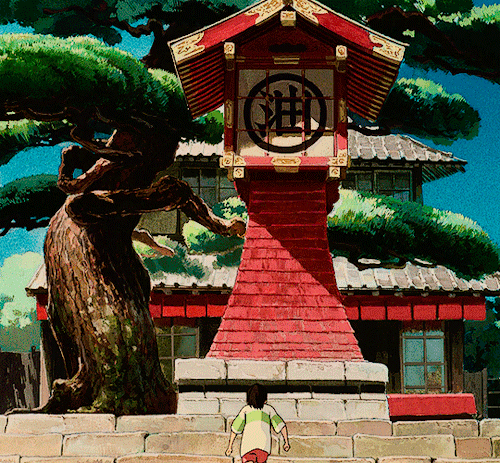

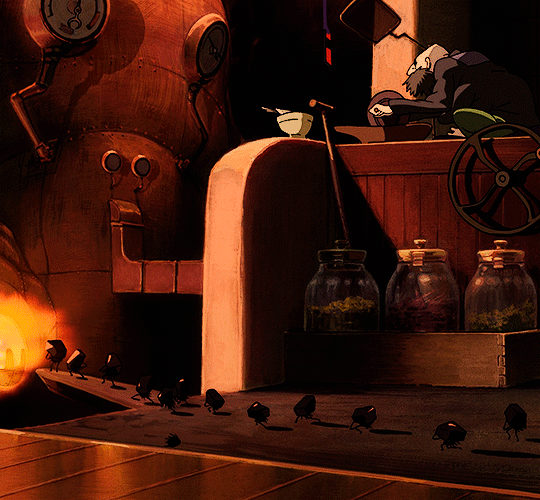
SPIRITED AWAY (2001) dir. Hayao Miyazaki
concept sketches / final result
Most common shots in filmmaking
Cinematography - Shot Types
Establishing Shot - a shot that establishes the setting of the scene. Usually a wide shot.

Titanic (1997)
Master Shot - A shot that includes all the actions of a scene. Usually a wide shot.

American Beauty (1999)
Two-Shot - A shot that has two subjects next to each other. Sometimes shows camaraderie.

Pulp Fiction (1994)
Over-the-Shoulder (OTS) - a shot of one subject that includes the shoulder of the character opposite the subject. Makes the scene feel more crowded or the characters closer.

The Dark Knight (2008)
Point-of-View (POV) - a shot from the perspective of a character, animal, or sometimes object. Can help convey what a certain character is feeling.

Reservoir Dogs (1992)
Tracking Shot - a shot that follows the action, usually on a dolly.

The Shining (1980)
Dutch Angle - a shot that is tilted to give the effect that something is not right. Also called: German angle; Dutch tilt; canted angle; oblique angle

Mission Impossible (1996)
High Angle - an angle that is shot from above the subject. Makes the subject appear small or powerless.

Matilda (1996)
Low Angle - an angle that is shot from below the subject. Makes the subject appear large and powerful.

Citizen Kane (1941)

Create your world around the time you are more productive. Daytime is not the best time for everyone!

via @extramadness
You see, hear, smell, touch, and feel everything through words. You should even feel your balance and inner sensations just by reading a script.
When putting together a scene on paper..
Be it in a script or in the early stages of notes, describe as much as you can. It’s better to have more to work with later, and you can always narrow it down in the process. Personally, I like to draw scenes out to help submerge myself into a piece. Working with your senses you can help others do the same when they’re looking at or even just reading your film and or writing.
Describe it as if you’ve never thought about the idea. Like you’re walking into a completely foreign place, because that’s what everyone else will be doing when they see your work
There is no such thing as originality. Our thoughts are influenced by other thoughts, our ideas are the sum of different pieces of other ideas.
Originality is just a puzzle arranged in an apparently different way.

-
 floramorgans liked this · 7 months ago
floramorgans liked this · 7 months ago -
 bruisedsentiments liked this · 2 years ago
bruisedsentiments liked this · 2 years ago -
 mr-arcturus liked this · 2 years ago
mr-arcturus liked this · 2 years ago -
 deviantpersuasion liked this · 2 years ago
deviantpersuasion liked this · 2 years ago -
 naughtypiggy reblogged this · 2 years ago
naughtypiggy reblogged this · 2 years ago -
 naughtypiggy liked this · 2 years ago
naughtypiggy liked this · 2 years ago -
 trueconfessionsofacurvygirl reblogged this · 2 years ago
trueconfessionsofacurvygirl reblogged this · 2 years ago -
 thecosmicstudyblr liked this · 5 years ago
thecosmicstudyblr liked this · 5 years ago -
 cottoncandyyclouds reblogged this · 5 years ago
cottoncandyyclouds reblogged this · 5 years ago -
 sublunaryloverslove reblogged this · 6 years ago
sublunaryloverslove reblogged this · 6 years ago -
 papave liked this · 6 years ago
papave liked this · 6 years ago -
 yongboxer liked this · 6 years ago
yongboxer liked this · 6 years ago -
 mia-stonen liked this · 6 years ago
mia-stonen liked this · 6 years ago -
 fouslecampsetmorte liked this · 6 years ago
fouslecampsetmorte liked this · 6 years ago -
 rodyija liked this · 6 years ago
rodyija liked this · 6 years ago -
 aniascorner reblogged this · 6 years ago
aniascorner reblogged this · 6 years ago -
 m1rr0rg4m3r reblogged this · 6 years ago
m1rr0rg4m3r reblogged this · 6 years ago -
 m1rr0rg4m3r liked this · 6 years ago
m1rr0rg4m3r liked this · 6 years ago -
 lindsword liked this · 6 years ago
lindsword liked this · 6 years ago -
 a-thousandcranes liked this · 6 years ago
a-thousandcranes liked this · 6 years ago -
 nudne liked this · 6 years ago
nudne liked this · 6 years ago -
 scarstudy-blog reblogged this · 6 years ago
scarstudy-blog reblogged this · 6 years ago -
 hoperosedavis-blog liked this · 6 years ago
hoperosedavis-blog liked this · 6 years ago -
 mobrcastle liked this · 6 years ago
mobrcastle liked this · 6 years ago -
 vcsupertramp reblogged this · 6 years ago
vcsupertramp reblogged this · 6 years ago -
 vcsupertramp liked this · 6 years ago
vcsupertramp liked this · 6 years ago -
 hellotoanewadventure liked this · 6 years ago
hellotoanewadventure liked this · 6 years ago -
 historiasluna reblogged this · 6 years ago
historiasluna reblogged this · 6 years ago -
 tweedledee27 liked this · 6 years ago
tweedledee27 liked this · 6 years ago -
 thebraveridedragons liked this · 6 years ago
thebraveridedragons liked this · 6 years ago -
 eremia liked this · 6 years ago
eremia liked this · 6 years ago
Wanderer, there is no way, you make the way as you go... Just a wanderer enjoying the rollercoaster.
176 posts